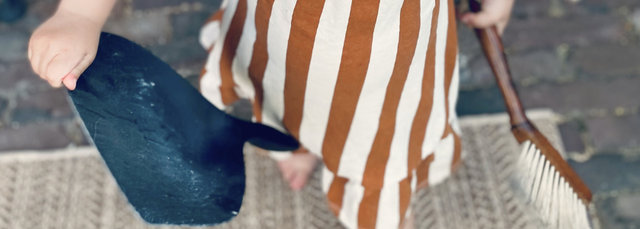Introduction to Montessori Practical Life Skills
Let’s explore a cornerstone of Montessori philosophy: Practical Life Skills. This fundamental concept will empower you to nurture your child's independence and confidence through everyday activities. This guide is here to empower you to integrate practical life skills into your daily routines with your child, nurturing their independence and confidence along the way.
What are Practical Life Skills?
In a Montessori school or daycare setting, Practical Life Skills are developed through are tasks that mimic everyday tasks adults perform, such as pouring water, buttoning a shirt, or sweeping the floor. These activities are designed to enhance a child's coordination, concentration, independence, and sense of order. In essence, they lay the foundation for future learning and foster a sense of capability and belonging in the child's environment.
At home, there’s no need to mimic. We can simply invite our children to participate! These activities aren't chores; they're opportunities for your child to develop important skills like coordination, concentration, independence, and responsibility.
Preparing for Future Independence
Even infants can participate in Practical Life activities! Simple tasks like grasping objects, exploring textures, and observing daily routines help infants develop essential motor skills and understand the world around them. As your child grows, gradually introduce age-appropriate activities like helping to spooning rice from one bowl to another during meal prep, wiping spills with a cloth, and eventually tasks like cleaning windows, and building furniture. These activities not only refine and maintain fine motor skills but also instil a sense of responsibility and purpose in your child, nurturing their physical, emotional, and mental health.
Practical Tips for Parents
-
Create a Prepared Environment: Set up your home to encourage independence. Store items at your child's eye level, provide child-sized tools, and create designated areas for different activities.
-
Observe and Follow Your Child's Lead: Watch your child closely to understand their interests and abilities. Offer activities that align with their developmental stage and follow their lead as they explore and engage with their environment.
-
Model and Collaborate: Demonstrate activities first, then invite your child to participate. Offer gentle guidance and encouragement when they seek it, and allow them to complete tasks independently whenever possible.
-
Encourage Persistence and Mastery: Encourage your child to repeat activities as often as they like. Mastery comes through practice, and each repetition builds confidence and competence.
-
Embrace the Mess: Practical Life activities can be messy, but they're invaluable opportunities for learning and growth. Focus on the process rather than the outcome, and celebrate your child's efforts and achievements along the way. Soon the mess will be replaced with a capable child. It’s worth it!
How to get started:
-
Start Small: Choose one or two practical life activities to introduce at a time.
-
Make it Fun: Turn chores into games or challenges to make them more engaging for your child. Use colourful materials, catchy songs, or silly voices to make tasks feel like playtime.
-
Be Patient: Learning new skills takes time and practice. Be patient with your child as they learn and don't be afraid to let them make mistakes along the way.
Learning to enjoy these meaningful tasks is the beginning of a lifelong love of learning. By inviting your child to participate in practical life activities, you're not only teaching them valuable skills but also fostering a sense of independence, responsibility, and pride in their abilities.
Thinking about opportunities to build practical life skills in your home?

